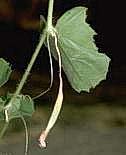Common environmental disorders of vegetables
Frequently vegetables show symptoms similar to those caused by diseases or other pests. However, they
may be caused by growing conditions rather than pest organisms. Some common symptoms include poor flavor,
lack of developed fruit, slow growth, no emergence, wilting, spotting, or burning of foliage, and discoloration.
Hot temperatures, changes in soil moisture and fertility, and harvesting too late may cause fruit to become
bitter or lacking in flavor. Cool temperatures, lack of light, poor soil quality, drought, or excess water
may cause plants to grow slowly, not develop properly, or not emerge at all. Improper soil pH or improper
fertilizers may deprive plants of important nutrients, causing them to wilt or discolor. Common environmental
disorders include blossom drop, sunscald, cold
injury and frost damage, lack
of pollination, nutrient
deficiencies, toxicities, and water
mismanagement.
Solutions
To maintain healthy vegetables, provide good plant health
care. Plant at the proper time recommended for your specific
area. Follow irrigation and fertilization requirements for your plant. Before planting,
remove any plant residue and choose a soil best suited for your vegetable. Soils that are crusty, too
salty, or too acidic may lead to further problems. Plant varieties recommended for your area, avoid crowding
of plants, and maintain regular care.
|

Water-logged potato plant |

Rocky
soil causes forked carrots
|

Heat
damaged cucumber
|
|


